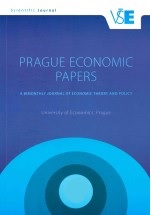Fiscal decentralization, political heterogeneity and welfare
Fiscal decentralization, political heterogeneity and welfare
Author(s): Erkmen Giray Aslim, Bilin NeyaptiSubject(s): Economy, Micro-Economics, Welfare systems
Published by: Vysoká škola ekonomická v Praze
Keywords: Fiscal decentralization; fiscal efficiency; welfare
Summary/Abstract: This paper contributes to the literature on fiscal decentralization by presenting a formalmodel of the interaction between the central and local governments (CG and LGs,respectively) where LGs may differ in their degree of political alignment with CG.The non-cooperative optimal behaviour of the agents reveals that optimal tax increaseswith the extent of fiscal decentralization (FD), political unison and spillovers acrosslocalities, while LGs’ optimal tax collection effort is negatively associated with allof these parameters. The first novel finding of our study is that both welfare peaks andincome distribution are more equitable at a lower level of FD in the case of spilloversthan in the case of no spillovers, which supports the decentralization theorem. The secondnovel finding is that both the amount of redistributable income and central governmentutility increase with the degree of political unison.
Journal: Prague Economic Papers
- Issue Year: 31/2022
- Issue No: 5
- Page Range: 347-376
- Page Count: 30
- Language: English

